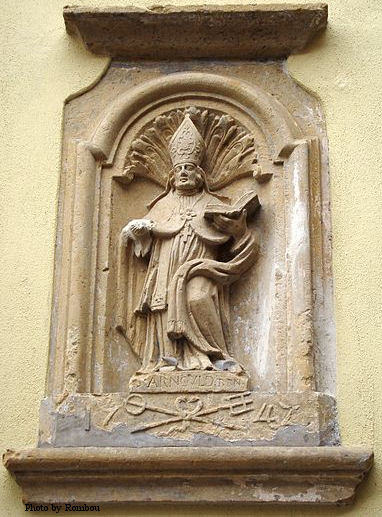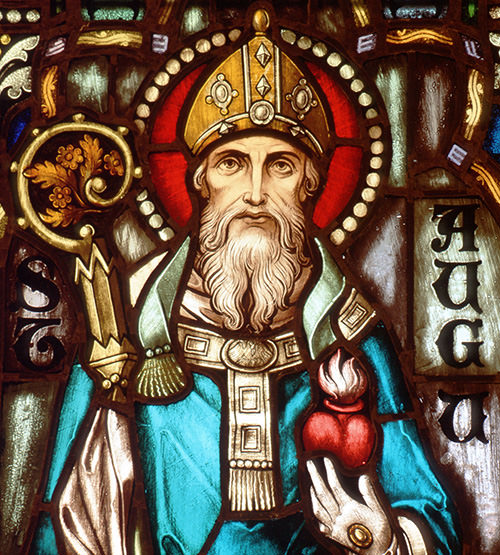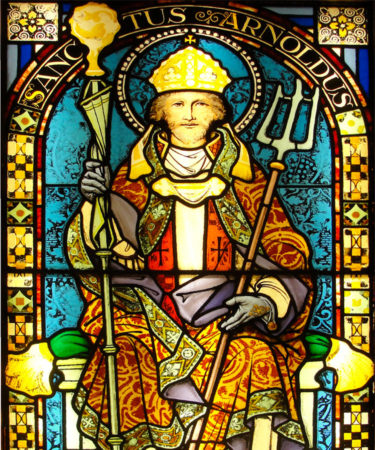“From man’s sweat and God’s love, beer came into the world.” Amen.
If you’re at all acquainted with the Catholic Church, you’ll know it doesn’t shy away from alcohol. From the use of wine in the Mass itself to the many generous monasteries that brewed, and lived upon, and generously shared so many vats of beer, the Church is no stranger to the fruits of fermentation. What we didn’t realize was that it had so many patron saints of beer (some more official than others). Good news for beer drinkers, who could use some heavenly guidance as we reach for a third triple IPA in one sitting. Assuming you have the enunciative capacity to pray at the end of your brewing, or drinking, session, we’ve gathered a few names to know.
Among some of the many (seriously, many) saints of suds are men like Saints Arnold of Soissons and Arnold** of Metz (that quote at the top is his). We mention them together because their beer-pertinent miracles are often confused. Here, Arnold of Soissons is said to have encouraged the townspeople of Oudenburg, Belgium, to drink beer because it would prevent plague. (In truth, flea bites spread plague; drinking beer more likely prevented cholera outbreaks, for which, yeah, we’d still be eternally grateful.)

But then here that very same credit is given to Arnold of Metz, though he’s also said to have “submerged his crucifix into a brew kettle and persuaded people to drink only beer from that ‘blessed’ kettle.” The same source attributes a different legend to Arnold of Soissons, namely that he was able to multiply a low supply of beer after an abbey brewery roof collapse (which, if true, would indeed be the greatest beer run ever). And just because nothing is ever simple in beer, or theology for that matter, this source cites a similar story relating to Arnold of Metz: villagers going to retrieve his body were thirsty after their journey, finding little beer at the abbey; a devout village called out to “Blessed Arnold” to “bring us what we lack,” and the beer filled up miraculously. We don’t have sufficiently giant beards or biblical schooling to sort this one out. One thing is certain: Arnold of Soissons is specifically a patron saint of hop pickers and came up with a brewing innovation involving the use of apiary equipment. So the association with brewing is legit, whatever his specific miracle, and he’s often depicted with a rake to associate him with brewing.
There was a 5th Century Saint Brigid of Ireland (apparently a good friend of Saint Patrick, about whom we still cherish many misconceptions every March 17th). Brigid is a patron saint of several things, including dairymaids, cattle, midwives, and newborns. But there’s also evidence of an equal passion for beer. Brigid worked for a time in a leper colony, and “when the lepers she nursed implored her for beer, and there was none to be had, she changed the water, which was used for the bath, into an excellent beer, by the sheer strength of her blessing and dealt it out to the thirsty in plenty.” And there are also attributed to her these lines, which later inspired both poem and song: “I should like a great lake of beer for the King of Kings. I should like the angels of Heaven to be drinking it through time eternal.” In heaven, bear in mind, there are no hangovers.
Then there’s the 4th Century’s Saint Nicholas of Myra—aka Saint Nick (we’ll get to that)—who has a sort of roundabout connection with brewing (not least because he’s also busy being the patron saint of sailors, repentant thieves, children, and prostitutes). But according to at least one story, Nicholas of Myra was traveling in disguise in Turkey and found himself at an inn when three travelers were robbed and murdered. Nicholas prayed to God for their resurrection, which led to an association “as a protector of travelers and brewers,” likely because as part of room and board, inns would provide beer. As for the Santa connection, Nicholas of Myra is feasted on December 6th, with children getting small presents and candies. The American tub-of-jolly that shimmies down our chimneys on the 25th derives, in part, from that. There’s also a story that he threw three sacks of gold down the chimneys of impoverished young women for a dowry, which gets us closer to the Santa connection. Dude was busy.
Another Christmas/brewing saint connection: Saint Wenceslas of what was then Czechoslovakia had more than a few good acts to his name. Beyond the famous song—wherein Good King Wenceslas insists on helping a peasant on a brutal wintry night—Wenceslas helped spread Christianity and supposedly outlawed the export of Bohemian hops. He was eventually assassinated (at quite a young age) by his brother, but the Czech people have revered him and his passionate protection of their native hops ever since.

The patron beer drinkers might identify with most is Saint Augustine of Hippo (now part of Tunisia). Born in the 4th Century A.D., Augustine lived an aggressively un-saintly early life, discovering an early an ardent love for alcohol consumption and all the naughty hedonism that attends it. Augustine did a lifestyle-180 upon his conversion, living as saintly as he could until his death at 76 (he recorded everything, from sin to salvation, in his famous Confessions). But brewers and drinkers in times of need probably tend to call upon those earlier years, when Augustine was cutting loose; even a life steeped in beer isn’t without its redemption.
*Arnold is the English spelling, though the saints are both often referred to as Arnuf.
